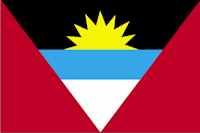Antigua & Barbuda - Government
 Antigua and Barbuda is a constitutional monarchy with a British-style parliamentary system of government. The reigning British monarch is represented in Antigua by an appointed Governor General as the head of state. The government has three branches: legislative, executive, and judicial.
Antigua and Barbuda is a constitutional monarchy with a British-style parliamentary system of government. The reigning British monarch is represented in Antigua by an appointed Governor General as the head of state. The government has three branches: legislative, executive, and judicial.
The bicameral Parliament consists of the seventeen-member House of Representatives, responsible for introducing legislation, and the seventeen-member Senate, which reviews and gives assent to proposed legislation. Representatives are elected by popular vote in general elections that are constitutionally mandated every five years but may be called earlier. Senators are appointed by the Governor General. The major figures in Parliament and the government come from the House of Representatives.
The Prime Minister is the leader of the party that holds the majority of seats in the House; the Opposition Leader is the representative, appointed by the Governor General, who appears to have the greatest support of those members opposed to the majority government. The Prime Minister creates an executive government and advises the Governor General on the appointments to thirteen of the seventeen seats in the Senate.
The leader of the opposition, recognized constitutionally, is responsible for advising the Governor General on the appointment of the remaining four senators to represent the opposition in the Senate. The Opposition Leader also consults with the Governor General, in conjunction with the Prime Minister, on the composition of other appointed bodies and commissions. In this way, the opposition is ensured a voice in government.
The executive branch is derived from the legislative branch. As leader of the majority party of the House of Representatives, the Prime Minister appoints other members of Parliament to be his cabinet ministers.
The judicial branch is relatively independent of the other two branches, although the magistrates are appointed by the Office of the Attorney General in the executive branch. The judiciary consists of the Magistrate's Court for minor offenses and the High Court for major offenses. To proceed beyond the High Court, a case must pass to the Eastern Caribbean States Supreme Court, whose members are appointed by the OECS. All appointments or dismissals of magistrates of the Supreme Court must meet with the unanimous approval of the heads of government in the OECS system; the Prime Minister of Antigua and Barbuda acts on the recommendation of the attorney general in making decisions concerning this judicial body. The Judicial Committee of the Privy Council, located in London, stands as the final court of appeal for Antigua and Barbuda.
As a result of its colonial history, Antigua and Barbuda’s judicial system is based in part on British common law practice. The judiciary is independent and the country operates an adversarial legal system. According to the US State Department, the judiciary generally enforced the constitutional right to a fair public trial, while the US non-government organisation (NGO) Freedom House has noted that the courts now successfully assert independence after having been manipulated by the previous administration (prior to 2004).
Antigua and Barbuda uses transparent policies and effective laws to foster competition and establish clear rules for foreign and domestic investors in the areas of tax, labor, environment, health, and safety. The Government of Antigua and Barbuda publishes laws, regulations, administrative practices and procedures of general application and judicial decisions that affect or pertain to investments or investors in Antigua and Barbuda. Where the national government establishes policies that affect or pertain to investments or investors that are not expressed in laws and regulations or by other means, the national government will make them publicly available.
|
NEWSLETTER
|
| Join the GlobalSecurity.org mailing list |
|
|
|

